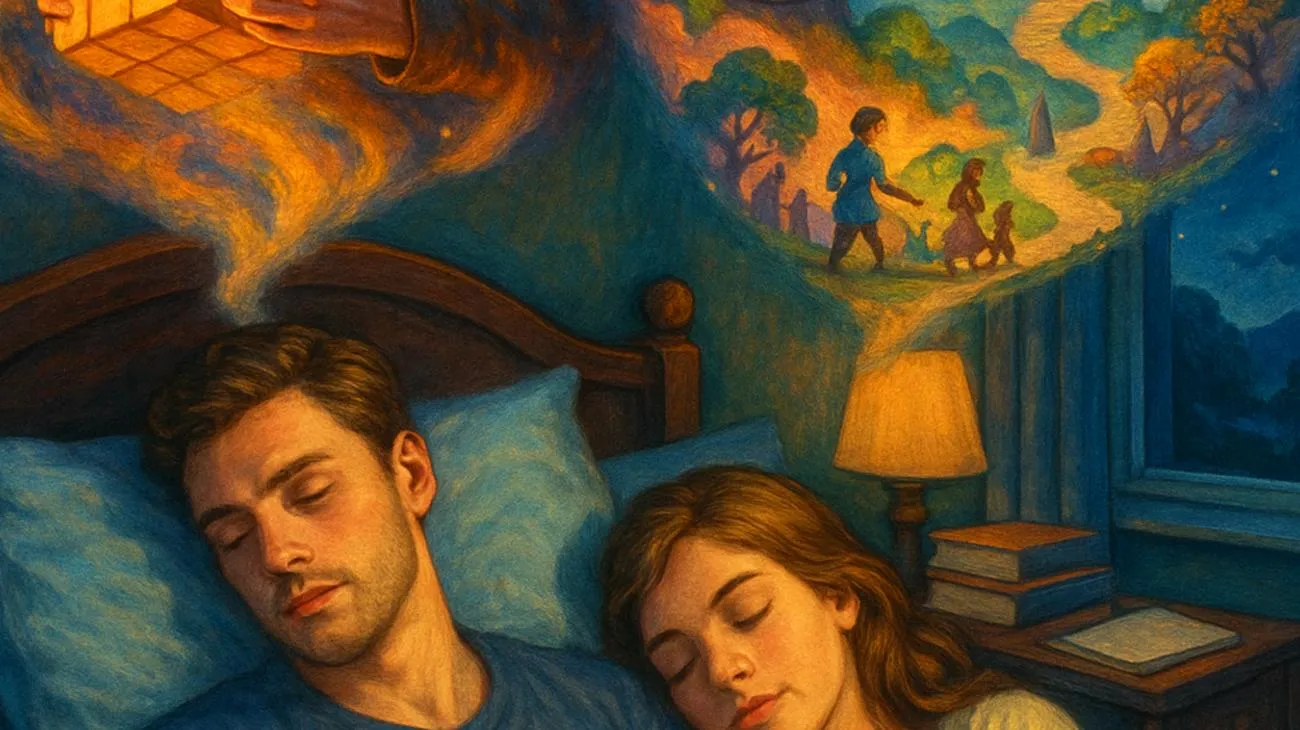Why Smart People Have Dreams That Feel Like Blockbuster Movies
Ever wonder why your super-smart friend always has these incredibly detailed dreams while you barely remember dreaming about your morning coffee? Turns out, there’s actually some fascinating science behind why intelligent people tend to experience dreams that are basically Netflix-level productions happening inside their heads every single night.
Recent psychological research has uncovered something pretty mind-blowing: people with higher cognitive abilities don’t just think differently when they’re awake – their brains are literally creating more complex and detailed dream experiences while they sleep. It’s like having VIP access to your own personal midnight movie theater, except your brain is the director, writer, and star of every show.
The Science Behind Your Brain’s Night Shift
A groundbreaking study analyzing dream content found something remarkable. Researchers discovered that individuals with stronger reasoning and verbal abilities have a superpower when it comes to incorporating their daily experiences into their dreams. We’re talking about the difference between watching a blurry home video versus experiencing a full HD movie with surround sound.
What makes this even more interesting is that this isn’t just about having “better” dreams for entertainment value. Scientists have found that people with enhanced cognitive abilities continue processing information during sleep in ways that create incredibly rich dream narratives. Their sleeping brains become like master storytellers, taking everything they learned during the day and weaving it into elaborate stories that would make Hollywood screenwriters jealous.
The research specifically focused on something called dream incorporation – basically how well your brain takes real-life experiences and integrates them into your dream world. Think of it as your mind’s ability to create a remix of your day, but instead of just playing the same old songs, highly intelligent brains are composing entirely new symphonies.
Your Brain’s Incredible Memory Remix System
Here’s where things get really wild. During sleep, everyone’s brain goes into what researchers call memory consolidation mode – essentially organizing and filing away all the information you’ve absorbed throughout the day. But for people with higher cognitive abilities, this process becomes incredibly sophisticated.
Instead of simply storing memories like files in a digital folder, their brains create complex webs of associations, connections, and narratives. It’s like having a personal assistant who doesn’t just organize your schedule but also creates detailed summaries, finds connections between different meetings, and even generates new ideas based on everything that happened.
This enhanced processing power means that when these individuals dream, they’re not just replaying the day’s events like boring security camera footage. They’re actively problem-solving, making creative connections, and sometimes even having genuine breakthrough moments. Some of history’s greatest discoveries reportedly came from dreams, and now we’re starting to understand why certain minds are more prone to these eureka moments during sleep.
The Verbal Intelligence Dream Advantage
One of the most fascinating findings from recent research is the specific connection between verbal abilities and dream complexity. People who excel in language skills – whether it’s storytelling, writing, or simply having an extensive vocabulary – tend to experience dreams with more detailed narratives and complex storylines.
This makes perfect sense when you think about it. If you’re someone who naturally processes the world through language, understands emotions through words, and thinks in detailed verbal frameworks, why wouldn’t your dreams follow the same pattern? These individuals essentially become the narrators of their own dream experiences, creating detailed storylines complete with character development and plot progression that rivals any bestselling novel.
Brain imaging studies have shown that the same neural networks involved in language processing during waking hours remain active during certain phases of sleep. For verbally gifted individuals, this means their dreams become rich tapestries of dialogue, internal monologue, and narrative structure. It’s like having a 24/7 creative writing workshop happening in your head.
The Problem-Solving Dream Machine
Here’s where things get absolutely incredible for all you analytical thinkers out there. Research has found that people with strong reasoning abilities don’t just have more vivid dreams – they actually continue working on problems while they sleep. It’s like having a dedicated think tank operating in your mind around the clock, except half the time you’re not even conscious it’s happening.
This phenomenon occurs when the brain uses dream states to work through complex challenges, make new connections between seemingly unrelated concepts, and sometimes arrive at solutions that completely stumped the conscious mind during waking hours. The reason this happens more frequently in individuals with higher cognitive abilities is tied to their enhanced neural connectivity.
Their brains maintain more active networks during sleep, allowing for the kind of creative cross-pollination of ideas that leads to innovative solutions and those amazing “aha!” moments that seem to come from nowhere. Mathematicians have solved equations in their dreams, inventors have visualized new creations, and writers have crafted entire stories – all while getting their beauty sleep.
The Learning Integration Superpower
One of the most remarkable aspects of this intelligence-dream connection is how efficiently some brains incorporate new learning into dream narratives. While everyone dreams about their daily experiences to some extent, people with higher cognitive abilities seem to have a turbocharged version of this process.
Instead of just replaying events like a mental DVR, their sleeping minds actively integrate new information with existing knowledge, creating dreams that feel like elaborate simulations or training scenarios. It’s as if their brains are saying, “Okay, we learned something fascinating today – let’s run some scenarios and see how this fits with everything else we know.”
This enhanced incorporation ability means that learning doesn’t stop when the books close or the lecture ends. The educational process continues through the night, with dreams serving as a sophisticated learning laboratory where new concepts are tested, refined, and permanently wired into long-term memory.
Key Signs Your Brain Is Working Overtime While You Sleep
- Dreams with detailed storylines and complex characters that feel like movie productions
- Problem-solving breakthroughs that occur after sleeping on difficult challenges
- Rich narratives incorporating multiple daily experiences woven together creatively
- Verbal conversations and internal dialogue playing prominent roles in dream content
The Creative Intelligence Factor
Research has also revealed fascinating connections between creative intelligence and dream experiences. Individuals who score highly on measures of creative thinking and innovative reasoning tend to report dreams with more unusual scenarios, unexpected plot twists, and novel solutions to problems.
This creative dream advantage isn’t just about having more interesting sleep stories – it’s about maintaining cognitive flexibility even during rest. Creative minds continue to make unusual associations, explore alternative possibilities, and generate original ideas throughout the sleep cycle. Their dreams become laboratories for innovation, testing grounds for new concepts, and incubators for breakthrough ideas.
The same regions associated with creative thinking during waking hours show increased activity during REM sleep in highly creative individuals. This suggests that creativity isn’t just a daytime job – it’s a round-the-clock cognitive process that never truly switches off, constantly working in the background to generate new possibilities.
What Makes Dreams Feel Like Epic Productions
- Enhanced neural connectivity creating richer sensory experiences during sleep
- Continuous creative processing that generates novel scenarios and storylines
- Advanced memory integration weaving together multiple experiences seamlessly
- Active problem-solving networks operating throughout different sleep phases
What This Actually Means for Your Sleep Experience
So what does all this research mean for your personal dream experience? First, if you’re someone who regularly wakes up feeling like you’ve lived through epic adventures, solved complex puzzles, or experienced incredibly detailed storylines, your brain might be giving you a nightly demonstration of its cognitive abilities.
But here’s the important part: this isn’t about being “better” or “worse” at dreaming. Everyone’s brain processes sleep differently, and dream experiences vary widely based on numerous factors including stress levels, sleep quality, and individual neurological differences. The key insight is that cognitive abilities can significantly influence how richly our minds weave together daily experiences into nighttime narratives.
Understanding this connection can also help explain why some people seem to benefit more from “sleeping on” difficult decisions or complex problems. If your brain is naturally inclined toward detailed dream incorporation and problem-solving during sleep, you might find that your best insights really do come after a good night’s rest.
The relationship between intelligence and dream richness represents one of the most fascinating frontiers in sleep research. While scientists are still unraveling all the mysteries of how cognitive abilities influence our nighttime experiences, the evidence is crystal clear: your brain power doesn’t clock out when you do.
For some people, sleep becomes an extension of their waking cognitive abilities – a time when reasoning, verbal skills, and creative thinking continue operating in the background, creating rich dream experiences that reflect their mental strengths. Whether you’re someone who experiences these vivid, complex dreams or you’re more of a “lights out, no memory” sleeper, both experiences are completely normal.
So the next time you wake up from an incredibly detailed dream feeling like you’ve just experienced an alternate reality complete with complex characters and intricate plotlines, take a moment to appreciate what might actually be happening. Your intelligent mind is working overtime to process, organize, and creatively reimagine your world – even while you sleep, throwing you a private screening of its own productions every single night.
Table of Contents

